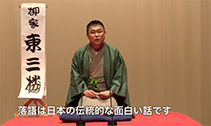Rakugo, and the "Art of Storytelling"
January 15, 2019 | Hannah Gainer, CASSH Communicaitons Assistant | casshcommunications@uwf.edu

Storytelling is one of the oldest forms of communication. Stories that have been passed down generations and every culture has traditional oral stories, each of which that have provided life lessons for all ages. Many cultures, such as the Japanese culture, see storytelling as something that is well respected. According to AllGoodTales.com, Japan has an ancient and highly respected culture, which extends to the art of storytelling with the traditional form of rakugo.
According to AllGoodTales.com, rakugo dates back to the Edo period (1602-1868). Rakugo which means “fallen words” is a traditional form of Japanese verbal storytelling. According to SamuraiTours.com, rakugo was invented by Buddhist monks in the 9th and 10th century to make their sermons more interesting. Gradually, the form turned from a humorous narrative into a monologue.
According to the BrooklynKura.com a lone storyteller tells stories without standing up from the sitting position on stage called a Koza. Rakugo started as a form of entertainment that anyone of any class could perform. However, gradually specialists emerged, known as rakugoka.
During a performance, a rakugoka, dressed in a kimono, remains seated throughout the performance. This storyteller plays the parts of several characters and uses only a paper fan and a small cloth as props. The storyteller performs tales of daily life and reinforces moral and historic lessons. The rakugo artist depicts a long comical story always involving the dialogue of two or more characters, changing the pitch, tone and slight turn of head to differentiate between characters.
“The laughter of rakugo transcends age, gender, nationality and cultural background.” - Takami Taylor, UWF Instructor of Japanese
According to Nippon.com, around the eighteenth-century traditional theaters called Yose charged audiences to watch rakugo performances in Edo, Osaka, and Kyoto. They developed their own distinctive styles. Edo rakugo is still performed in Tokyo, while Osako-style storytelling is known as Kamigata rakugo. The Kyoto school, however, has apparently died out.
Rakugo remains popular as one of Japan’s representative classical arts. It’s rooted in everyday life and is very close to the lives of the Japanese people.
Takami Taylor, UWF Japanese instructor, says a rakugo style (Oogiri) TV comedy program has been running since 1966 in Japan and in some traditional theaters in Tokyo and Osaka rakugo performances run every day.
“The scenes described are the everyday lives of ordinary people in rakugo. The characters are people who can be found anywhere in the world or can be related to yourself,” Taylor added. “The laughter of rakugo transcends age, gender, nationality and cultural background.”
UWF will host a rakugo performance on campus, which will feature Master Yanagiya Tozaburo III as the storyteller for the upcoming event “Rakugo: Art of Storytelling,” Thursday, Jan. 17 from 1-2:30 p.m. in Building 86, Room 129.
According to JETwin.com, rwas born and raised in Tokyo, he became a disciple of master rakugo performer Yanagiya Gontaro III in 1999, after dropping out of a university. He was promoted to the master Shin’uchi rank, in which he is certified to train disciples. He has performed all over Japan and has appeared on many television programs.
World Languages at UWF, has brought a variety of cultural event to campus.
“We are committed to provide students with opportunities to gain knowledge and understanding of other cultures” - Laura Arguea, UWF World Languages Coordinator
“Events such as the preview of the opera “Florencia en el Amazonas”, as well as “Rakugo: The Art of Storytelling,” strongly impact the audience, engaging students in meaningful language and culture experience,” Laura Arguea, UWF World Languages program coordinator said. “It is very important to promote these types of events, where students are exposed to other languages and cultures beyond the classroom setting.”
The University of West Florida, World Language Program offers basic, intermediate and advanced language and culture courses, as well as a minor in Spanish.
“We are committed to provide students with opportunities to gain knowledge and understanding of other cultures” Arguea added.
For more on UWF’s language offerings, visit the UWF World Languages program.






